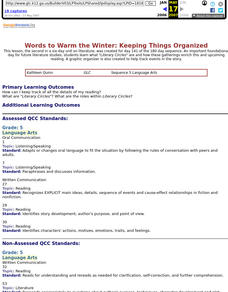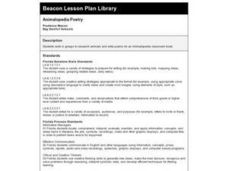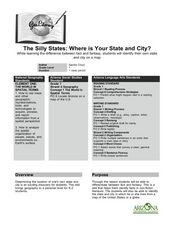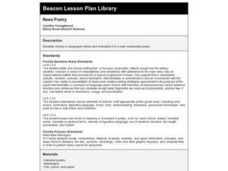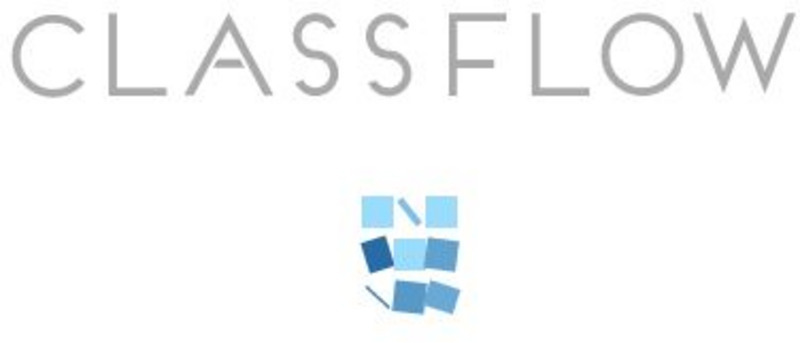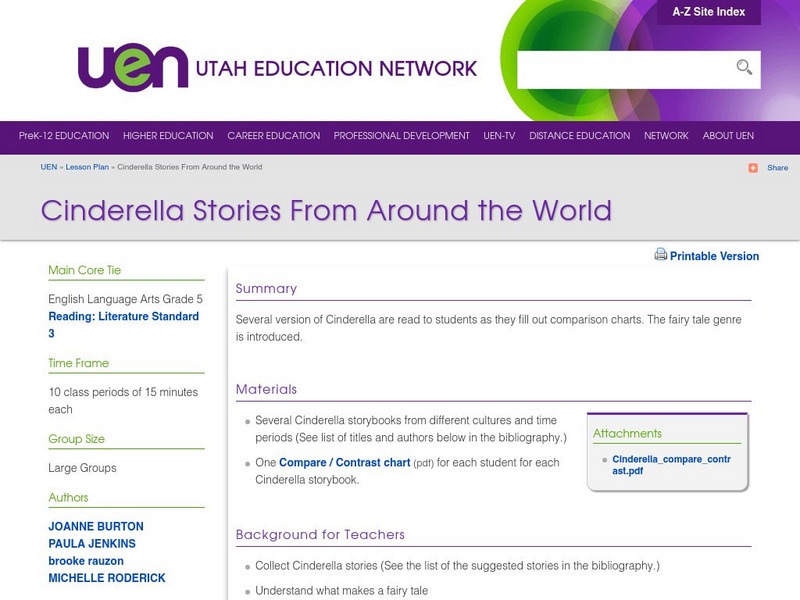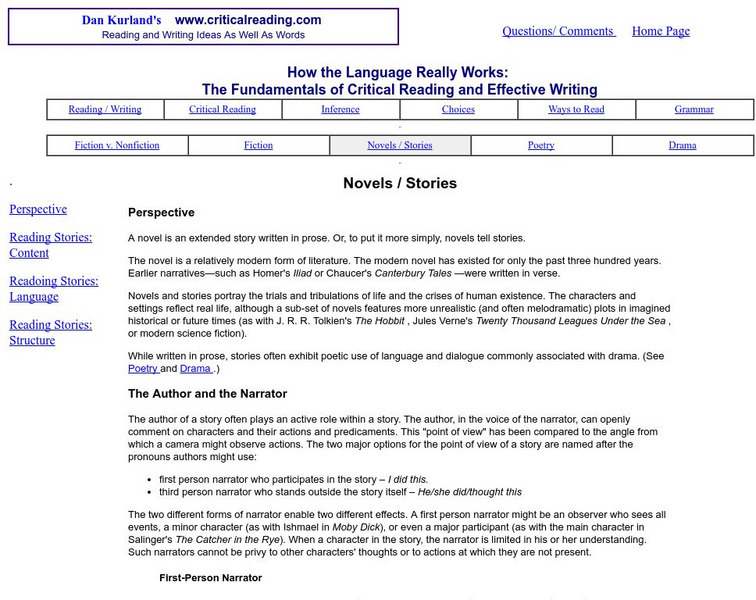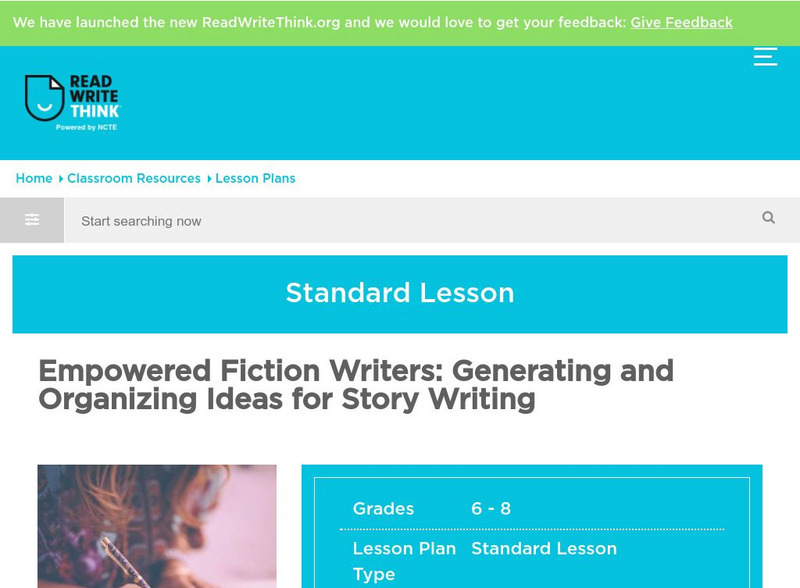Curated OER
Author, Author!
Third graders, in groups, select and research a favorite studenT author or illustrator. They answer questions about the author, conduct research and prepare a PowerPoint presentation with their findings.
Curated OER
Voices at Whisper Bend
Students examine life in Pennsylvania during and after World War II. Using primary source documents, they compare the unity of the United States during World War II and the Iraq War. They also discover how citizens adapt to the war at home.
Curated OER
Words to Warm the Winter: Keeping Things Organized
Fifth graders are in Literary Circles according to the book they've chosen and choose roles.
Curated OER
Animalopedia Poetry
Students reseach animals while working in groups. They write poems to be included in a class Animalopedia book.
Curated OER
The Silly States: Where Is Your State and City?
First graders read The Scrambled States of America and discuss whether it is real or fantasy as compared to the United States. In this geography lesson, 1st graders identify their city or state on a map and work in groups to color the...
Curated OER
News Poetry
Third graders select a small item in a newspaper and then dramatize it in a well-constructed poem. They share their poems with the class.
Department of Defense
Do Dea: Story, Identity, Unity
Delve into the art of storytelling in this self-guided unit. Multiple topics are covered such as literary genres, the 7 elements of fiction, figurative language, theme, characterization, etc. At the end of the unit, write your own flash...
Annenberg Foundation
Annenberg Learner: Interactives: Elements of a Story
Explore the elements of a story using the well-known Cinderella story as source material. Learn about setting, character, sequence, exposition, conflict, climax, and resolution.
Tom Richey
Slideshare: Introduction to the Elements of Fiction
A slide show with twenty-two slides about story elements. Includes definitions, information, and examples of character terms, setting terms, plot terms, conflict terms, and more
Georgia Department of Education
Ga Virtual Learning: Contemporary Literature: The Modern Short Story
This lesson is an introduction to the modern short story including defining the short story, how the modern short story differs from the classic short story, the elements of a short story, and what is to be expected in this unit.
ClassFlow
Class Flow: Story Elements
[Free Registration/Login Required] This flipchart reviews the five main elements of a fiction story using the example of Goldilocks and the Three Bears.
Caro Clarke
Historical Fiction: Who Rules?
This is the fifteenth article in a series designed to help the new novel author. This article focuses on the genre of historical fiction and the role of the author. Is the author a researcher or a story-teller?
Georgia Department of Education
Ga Virtual Learning: Ninth Literature and Composition: Short Stories
This lesson provides and introduction to a short story unit. It focuses the lessons and morals taught by short stories and the use of literary elements in fiction. I provides a list of essential questions.
Utah Education Network
Uen: Cinderella Stories From Around the World
In this lesson plan, 5th graders will compare and contrast different versions of the fairy tale "Cinderella." Students will use a compare and contrast chart chart. After the shared readings, students will use all the elements of a fairy...
Other
How the Language Really Works: Novels and Stories
This brief article explains perspective, types of narrators, and the elements of fiction.
Annenberg Foundation
Annenberg Learner: Literary Visions
A series of 24 instructional videos, each about 30 minutes in length, designed to teach literary analysis. Topics include Responding to Literature, The Elements of Short Fiction, Tone and Style in Short fiction, The Elements of Poetry,...
ReadWriteThink
Read Write Think: Empowered Fiction Writers: Generating and Organizing Ideas
Do your students' minds go blank when they confront a blank piece of paper? Speedwriting can help them get started with writing as well as come up with topics to write about. They can then incorporate their key ideas and phrases into a...
Other
Fiction Writing Tips: Creating a Vivid Setting
Some excellent guidelines to consider when evaluating your setting in a short story or novel. Discusses the importance of setting, some examples, as well as practical advice in setting your story. W.11-12.3d Sensory/precise lang narratives
Texas Education Agency
Texas Gateway: Analyze the Central Characters in Literary Text/fiction
In this lesson, students will learn some ways that writers reveal the complexity of their characters. By closely analyzing one author's characters, they will come to see how their words, actions, and interactions with one another can...
Utah Education Network
Uen: Create a Book (Grade 3 6)
Students will illustrate and write their own story.
Other
Wilsonplays: Elements of Fiction
A chart that lists and defines the elements of a story including: character, setting, events, problem, and solution.
Other
Elements of Fiction
Simple discussion of the elements of fiction with a specific section devoted to Freytag's Pyramid (aka "basic plot structure"). A good place to start for gathering information on the structure of narrative.
Caro Clarke
Writing Advice: Where to Start?
This writing tutorial focuses on helping the aspiring author find a good place to start on his or her fiction.
ReadWriteThink
Read Write Think: Planning Story Characters Using Interactive Trading Cards
Students use trading cards to examine fictional characters in a story.




